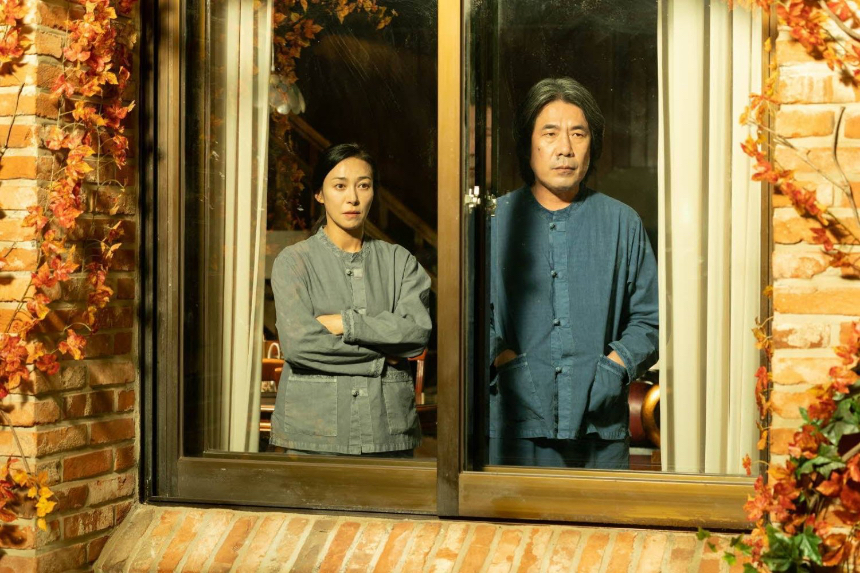Fantasia 2024 Review: 4PM, Where the Social Contract Is Weaponized

Jay Song’s two-hour implosion of the social contract, 4PM is delightfully frustrating, and terribly absurd. It is loosely based on the Belgian novel The Stranger Next Door, written by Francophone author Amélie Nothomb, and plays as if that scene from ‘The Burbs — the one where a meet-the-neighbours visit sees all parties sit in awkward, tense silence until Tom Hanks chokes on a sardine topped pretzel — was stretched out to feature film length. Where fruitless small talk, due to the desire to be polite, turns into a comic-existential horror film. The pace is often restrained, but the camera work is utterly manic.
Jeong-In, a philosophy professor who about to embark on a one year sabbatical, decides to buy a home in the Korean countryside, and live quietly, peacefully, away from the smog and the hubbub of Seoul. All he wants to do is take long walks in the forest, chop wood, and eat outdoor meals with his wife Hyeon-Sook. On his last lecture, he tells his students,”the future is unknown, and the past idles forever. Be at peace in the present.”
Oh boy, will he regret this.
Upon scraping another vehicle with their Tesla in the parking lot, a down note on what should be a positive life change, Jeong-In and Hyeon-Sook get out of their responsibilities, and rationalize to themselves that because the other driver was sleeping drunk in his car, they are doing him a favour by not reporting (and conveniently not paying for) the damage they caused. This is at odds with the professional, and upstanding image they present to themselves and the world.
Karma is about to do its thing over the next two hours.
When the couple arrive at their beautiful country home, they quickly settle in to a routine of tea service, chime-bowl meditation, and domestic busy-work. They notice that there is only a single nearby house, whose owner does not appear to be home much, or perhaps simply keeps his lights off.
Being polite, and knowing it is the ‘right thing to do,’ they knock on his door to introduce themselves, but get no answer on a couple occasions. Again, being the ‘right thing to do,’ they leave a note, inviting him over for a visit at his leisure.
The man shows up precisely at 4pm, sits down quietly, drinks the tea on offer, and refuses to make small talk. He offers only terse single word answers to the ice-breaking questions thrown his way by his hosts. At 6pm he abruptly gets out of his chair and leaves.
Jeong-In and Hyeon-Sook are confused. Things quickly turns to dread as the man returns to their home every day at precisely 4pm, stays to exactly until 6pm and abruptly leaves. This Groundhog Day of social visits, lets the couple cycle through their list of ‘appropriate,’ and some ‘less appropriate,’ tactics to this mystery, but they are, by their own making, trapped by their own warped notions of politeness and manners.
Even at the pain of apprehension of 4pm every single day. Hyeon-Sook looks to run away, lock the doors and hide in this bedroom. Jeong-In, a student of Jorge Luis Borges wants to explore the mental labyrinth of the situation.
The daily guest, Yook-Nam is a cardiac doctor. (Again, ‘The Burbs Klopek occupation comes to mind). But his quiet stoicism, blank visage, and unwillingness to offer explanation, is giving his host a slow-motion heart attack, as evidenced by Jeong-In’s nervous tick of blowing on his fingers and shaking them as a coping mechanism.
The daily guest, Yook-Nam is a cardiac doctor. (Again, ‘The Burbs Klopek occupation comes to mind). But his quiet stoicism, blank visage, and unwillingness to offer explanation, is giving his host a slow-motion heart attack, as evidenced by Jeong-In’s nervous tick of blowing on his fingers and shaking them as a coping mechanism.
This is one of a plethora of visual tools used by Jay Song to keep the film visually dynamic, while highlighting the absurdity of suffering for the sake of manners — which, admittedly is a pretty much universal thing in all societies and cultures. He uses camera push ins, time lapse photography, obsessive macro-shots of the household wall clock, at one point the camera even assumes the point of view of the minute hands on said clock. Close-up reaction shots do a lot of the comedic heavy lifting here, although the editing, at times, is equally effective.
The only issue is that after a nearly pitch-perfect first hour, 4PM begins to escalate, and seems to lack the confidence in annoying its audience as function of the on screen couple’s suffering, or the very thesis of the story. The ante gets upped, when the nature of the idea (at least in my limited understanding) should, perhaps, remain static. Your mileage may vary as 4PM eschews spinnings its wheels, but film does have much to say, and seems to delight in saying it, visually. The medium of film is often at its best when it shows, but does not tell.
4PM probes the notion of how one can be at peace with themselves, and handle silence. Punishing silence. Where does the curiosity of small talk get weaponised into gossip and stalking? Where does mild social awkward into acute physical pain? It constantly invites, ‘what would you do’ thoughts while it unfolds. It implores the audience to think hard what it is to “know thyself,” or be comfortable in their own skin. In the end, a bit defeated, the film argues for another old adage, sometimes when it comes to your neighbors, “ignorance is bliss.” Sardine?

Do you feel this content is inappropriate or infringes upon your rights? Click here to report it, or see our DMCA policy.






